Решил в отпуске изучить разработку под Vive в Unity3D. Погуглил парочку примеров и начал пробовать, но почему то не работало. Начав подробней разбираться и обнаружил, что Valve выкатили недавно обновление плагина для Unity3D — новая, сильно переделанная версия. В ней появилось парочка принципиальных новшеств, которые сделали старые tutorial'ы не актуальными. Решил написать новый
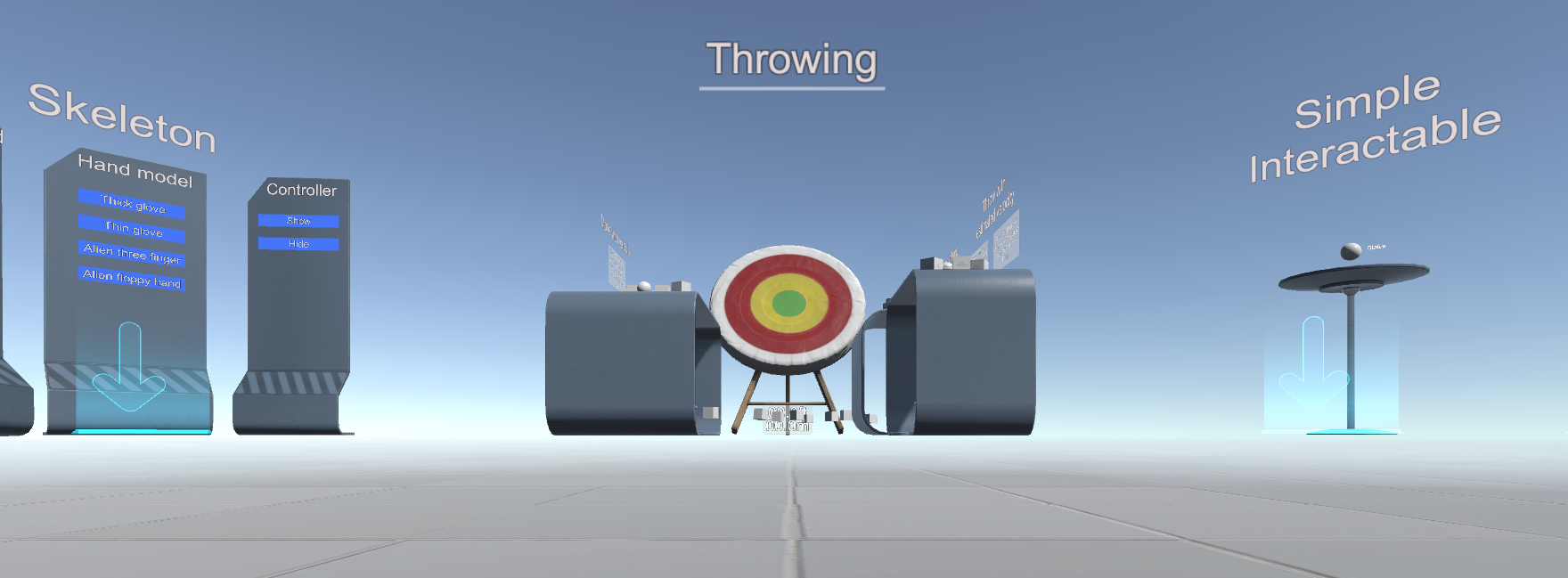
Нам понадобится Unity >= 5.4.0 и новый плагин SteamVR Plugin (GitHub)
В самом плагине есть три полезных для ознакомления pdf'ки
\Assets\SteamVR\SteamVR Unity Plugin.pdf
\Assets\SteamVR\SteamVR Unity Plugin — Input System.pdf
\Assets\SteamVR\InteractionSystem\InteractionSystem.pdf
И два примера:
\Assets\SteamVR\Simple Sample.unity
\Assets\SteamVR\InteractionSystem\Samples\Interactions_Example.unity
Плагин поддерживает режим имитации — он включается если не включен шлем
Ну а теперь по шагам;
Создадим новый проект по шаблону 3D с плагином SteamVR Plugin
Соглашаемся с настройками

Теперь ключевой момент — нужно настроить управление. Выбираем пункт меню Window\SteamVR Imput

Unity спросит про отсутствующий actions.json и предложит скопировать файл примера (он лежит в \Assets\SteamVR\Input\ExampleJSON) — советую согласиться.

По json-файлам видно, что плагин рассчитан не только на Vive, но и на Oculus и Windows MR, а также новые контролеры knuckle. С этим связанны основные изменения.
В открывшемся окне достаточно нажать "Save and generate"

Теперь нужно добавить Игрока (Player из \Assets\SteamVR\InteractionSystem\Core\Prefabs) в Сцену и удалить Main Camera
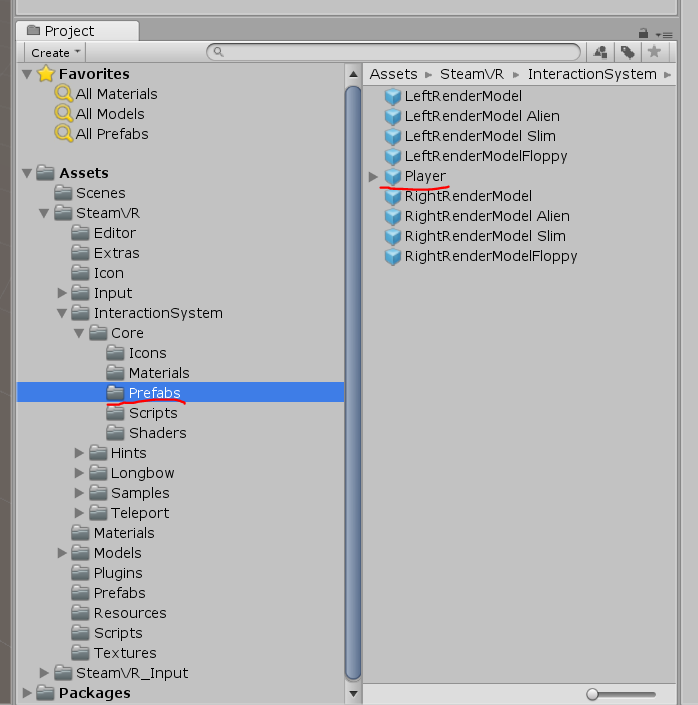
что бы работал режим имитации — он должен быть включён в свойствах Игрока
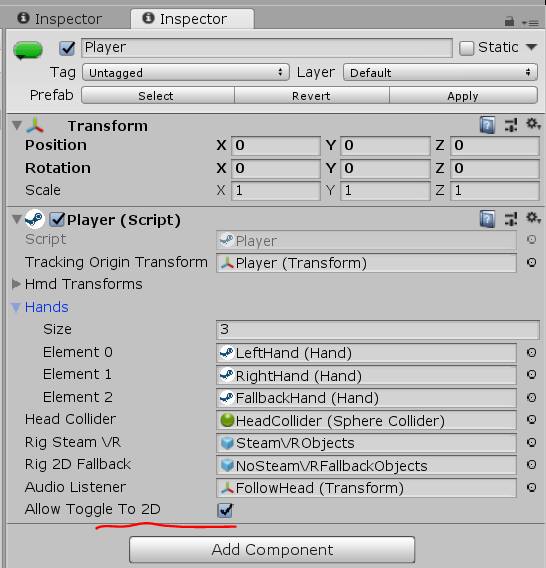
Ещё полезно скопировать папку \Assets\SteamVR\InteractionSystem\Core\Icons в \Assets и переименовать её в Gizmos
Можно нажимать Play — но только фальшивая рука в имитации работать не будет, нужно скопировать скрипт от сюда и повесить его на Player->NoSteamVRFallbackObjects->FallbackHand
using System.Collections.Generic;
using UnityEngine;
using Valve.VR;
public class VrSimulatorHandFixer156 : SteamVR_Behaviour_Pose
{
Valve.VR.InteractionSystem.Hand _hand;
protected override void Start()
{
base.Start();
_hand = this.gameObject.GetComponent<Valve.VR.InteractionSystem.Hand>();
_hand.handType = SteamVR_Input_Sources.RightHand;
GameObject broHand = GameObject.Instantiate(_hand.gameObject);
Destroy(broHand.GetComponent<VrSimulatorHandFixer156>());
broHand.SetActive(false);
_hand.otherHand = broHand.GetComponent<Valve.VR.InteractionSystem.Hand>();
_hand.otherHand.handType = SteamVR_Input_Sources.LeftHand;
var spoofMouse = new SpoofMouseAction();
_hand.grabGripAction = spoofMouse;
spoofMouse.InitializeDictionariesExposed(_hand.handType);
this.poseAction = new Poser_SteamVR_Action_Pose();
}
protected override void OnEnable()
{
}
protected override void Update()
{
_hand.grabGripAction.UpdateValue(SteamVR_Input_Sources.RightHand);
}
protected override void OnDisable()
{
}
protected override void CheckDeviceIndex()
{
}
//----------------------------------------------------------------------------------------------
class SpoofMouseAction : SteamVR_Action_Boolean
{
public SpoofMouseAction()
{
}
public void InitializeDictionariesExposed(SteamVR_Input_Sources source)
{
try
{
InitializeDictionaries(source);
}
catch(System.Exception e)
{
}
}
protected override void InitializeDictionaries(SteamVR_Input_Sources source)
{
base.InitializeDictionaries(source);
onStateDown.Add(source, null);
onStateUp.Add(source, null);
actionData.Add(source, new InputDigitalActionData_t());
lastActionData.Add(source, new InputDigitalActionData_t());
}
public override void UpdateValue(SteamVR_Input_Sources inputSource)
{
lastActionData[inputSource] = actionData[inputSource];
tempActionData.bState = Input.GetMouseButton(0) || Input.GetMouseButtonDown(0);
tempActionData.bChanged = Input.GetMouseButtonDown(0) || Input.GetMouseButtonUp(0);
tempActionData.bActive = true;
//tempActionData.fUpdateTime
//tempActionData.act
actionData[inputSource] = tempActionData;
changed[inputSource] = tempActionData.bChanged;
active[inputSource] = tempActionData.bActive;
activeOrigin[inputSource] = tempActionData.activeOrigin;
updateTime[inputSource] = Time.time;// tempActionData.fUpdateTime;
if (changed[inputSource])
lastChanged[inputSource] = Time.time;
if (onStateDown[inputSource] != null && GetStateDown(inputSource))
onStateDown[inputSource].Invoke(this);
if (onStateUp[inputSource] != null && GetStateUp(inputSource))
onStateUp[inputSource].Invoke(this);
if (onChange[inputSource] != null && GetChanged(inputSource))
onChange[inputSource].Invoke(this);
if (onUpdate[inputSource] != null)
onUpdate[inputSource].Invoke(this);
if (onActiveChange[inputSource] != null && lastActionData[inputSource].bActive != active[inputSource])
onActiveChange[inputSource].Invoke(this, active[inputSource]);
}
}
class Poser_SteamVR_Action_Pose : SteamVR_Action_Pose
{
public override bool GetActive(SteamVR_Input_Sources inputSource)
{
return false;
}
}
}В режиме VR при включенных контролерах — они будут видны
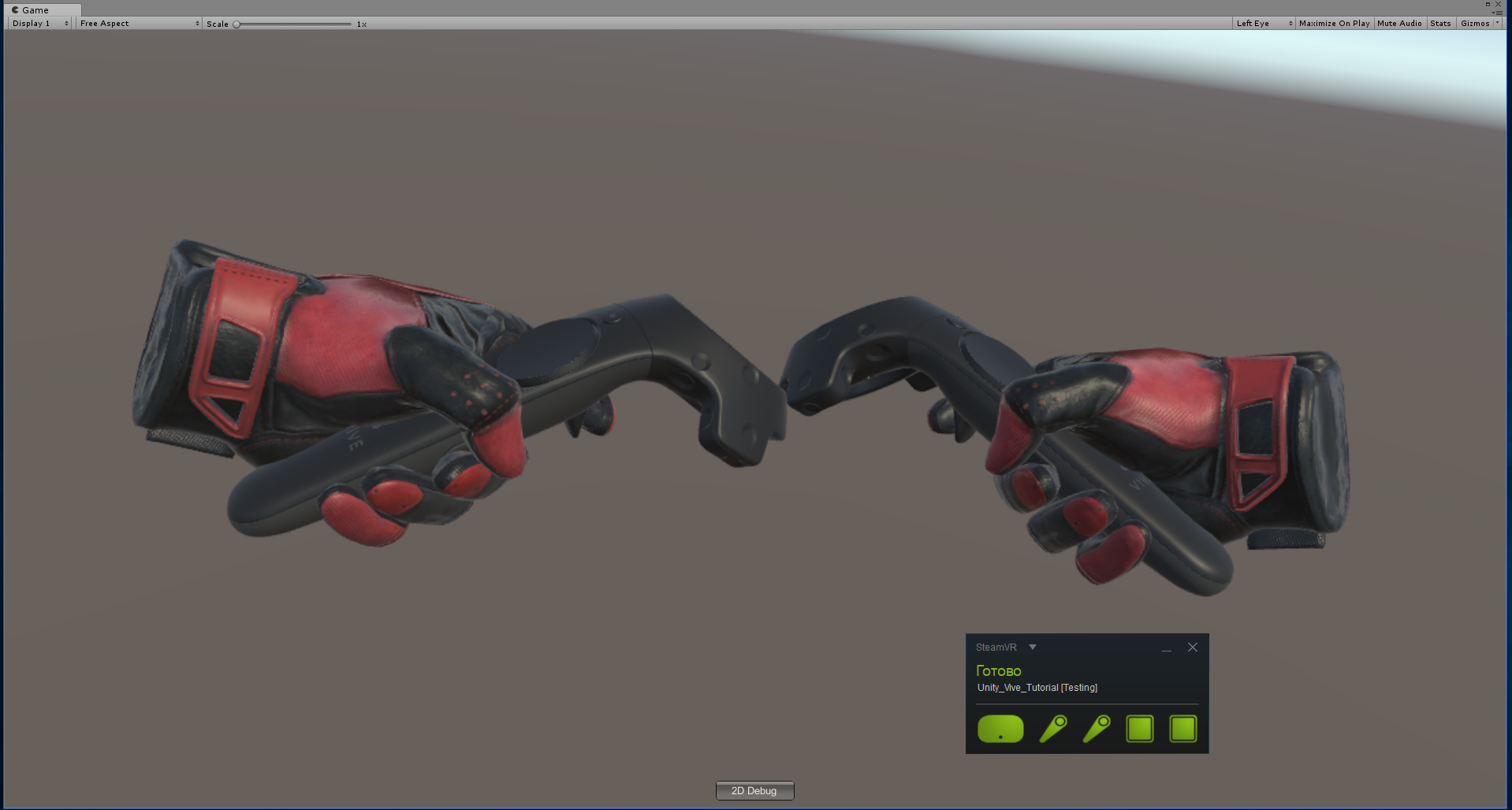
Мы добавили VR, но даже перемещаться не можем. В плагине есть реализация телепортации
для её включения нужно добавить в сцену Teleporting из \Assets\SteamVR\InteractionSystem\Teleport\Prefabs
а также расставить TeleportPoint от туда же

Телепортироватся можно и в имитации — клавишей T.
Можно создать поверхность телепортации — Создаём поверхность (plane) и вешаем на неё скрипт TeleportArea.cs из \Assets\SteamVR\InteractionSystem\Teleport\Scripts

Попробуем взаимодействие с объектами — создадим Cube и повесим на него скрипт Interactable.cs из \Assets\SteamVR\InteractionSystem\Core\Scripts
теперь он подсвечивается, но с ним ничего не происходит
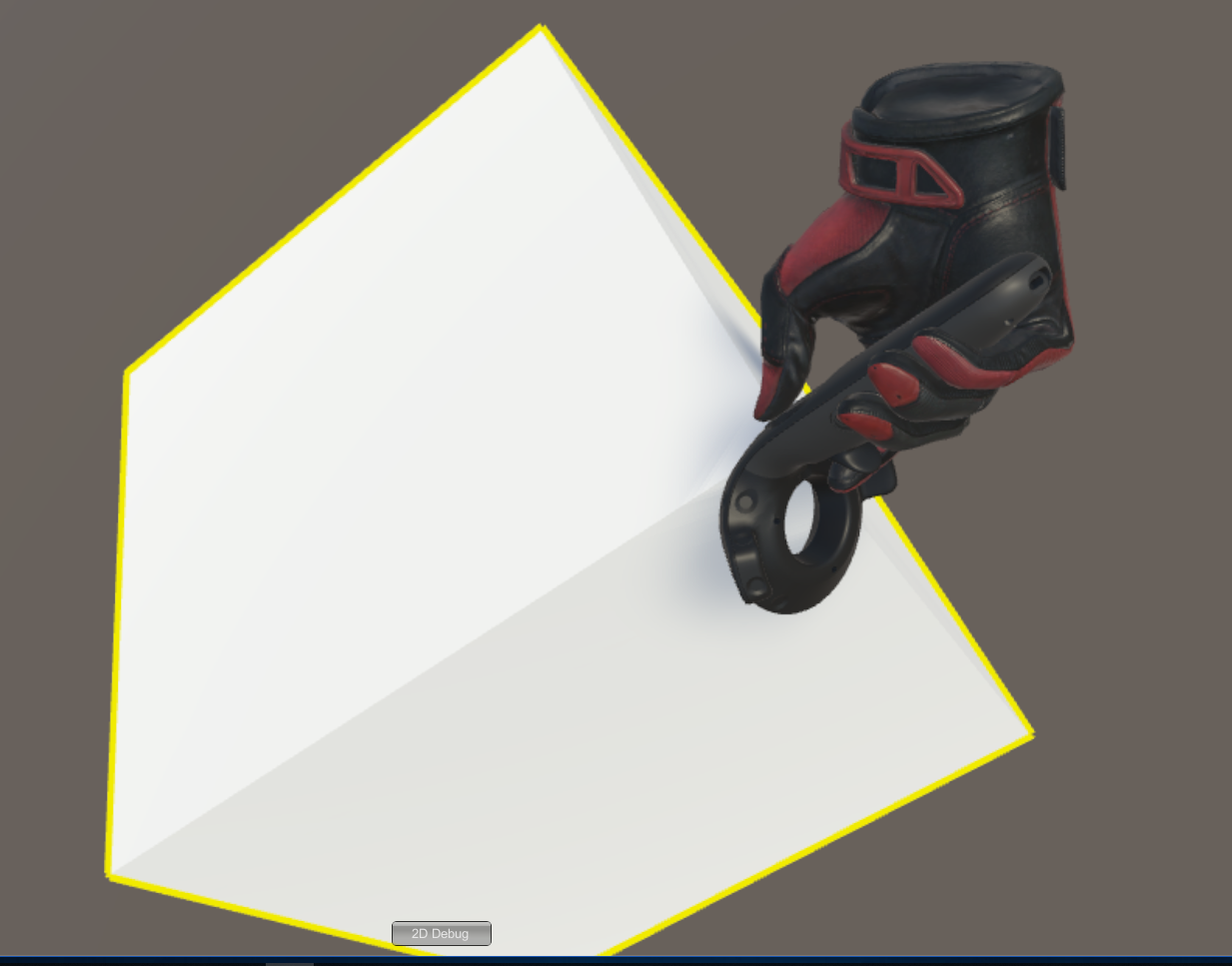
Нам нужно прописать взаимодействие — создадим для Cube новый скрипт
using System.Collections;
using System.Collections.Generic;
using UnityEngine;
using Valve.VR.InteractionSystem;
public class NewBehaviourScript : MonoBehaviour {
private Hand.AttachmentFlags attachmentFlags = Hand.defaultAttachmentFlags & (~Hand.AttachmentFlags.SnapOnAttach) & (~Hand.AttachmentFlags.DetachOthers) & (~Hand.AttachmentFlags.VelocityMovement);
private Interactable interactable;
// Use this for initialization
void Start () {
interactable = this.GetComponent<Interactable>();
}
private void HandHoverUpdate(Hand hand)
{
GrabTypes startingGrabType = hand.GetGrabStarting();
bool isGrabEnding = hand.IsGrabEnding(this.gameObject);
if (startingGrabType != GrabTypes.None)
{
// Call this to continue receiving HandHoverUpdate messages,
// and prevent the hand from hovering over anything else
hand.HoverLock(interactable);
// Attach this object to the hand
hand.AttachObject(gameObject, startingGrabType, attachmentFlags);
}
else if (isGrabEnding)
{
// Detach this object from the hand
hand.DetachObject(gameObject);
// Call this to undo HoverLock
hand.HoverUnlock(interactable);
}
}
}Более подробно про взаимодействие можно посмотреть в примерах к плагину, в частности в \Assets\SteamVR\InteractionSystem\Samples\Scripts\InteractableExample.cs
А мы дальше попробуем сделать то, чего в примерах нет — добавить новые действия
Откроем скрипт Player.cs и добавим поля
[SteamVR_DefaultAction("PlayerMove", "default")] public SteamVR_Action_Vector2 a_move; [SteamVR_DefaultAction("PlayerRotate", "default")] public SteamVR_Action_Vector2 a_rotate; [SteamVR_DefaultAction("MenuClick", "default")] public SteamVR_Action_Boolean a_menu;
Допустимые типы для возвращаемых значений можно посмотреть в \Assets\SteamVR\Input
И метод Update:
private void Update()
{
bool st = a_menu.GetStateDown(SteamVR_Input_Sources.Any);
if (st)
{
this.transform.position = new Vector3(0, 0, 0);
}
else
{
Camera camera = this.GetComponentInChildren<Camera>();
Quaternion cr = Quaternion.Euler(0, 0, 0);
if (camera != null)
{
Vector2 r = a_rotate.GetAxis(SteamVR_Input_Sources.RightHand);
Quaternion qp = this.transform.rotation;
qp.eulerAngles += new Vector3(0, r.x, 0);
this.transform.rotation = qp;
cr = camera.transform.rotation;
}
Vector2 m = a_move.GetAxis(SteamVR_Input_Sources.LeftHand);
m = Quaternion.Euler(0, 0, -cr.eulerAngles.y) * m;
this.transform.position += new Vector3(m.x / 10, 0, m.y / 10);
}
}//======= Copyright (c) Valve Corporation, All rights reserved. ===============
//
// Purpose: Player interface used to query HMD transforms and VR hands
//
//=============================================================================
using UnityEngine;
using System.Collections;
using System.Collections.Generic;
namespace Valve.VR.InteractionSystem
{
//-------------------------------------------------------------------------
// Singleton representing the local VR player/user, with methods for getting
// the player's hands, head, tracking origin, and guesses for various properties.
//-------------------------------------------------------------------------
public class Player : MonoBehaviour
{
[Tooltip( "Virtual transform corresponding to the meatspace tracking origin. Devices are tracked relative to this." )]
public Transform trackingOriginTransform;
[Tooltip( "List of possible transforms for the head/HMD, including the no-SteamVR fallback camera." )]
public Transform[] hmdTransforms;
[Tooltip( "List of possible Hands, including no-SteamVR fallback Hands." )]
public Hand[] hands;
[Tooltip( "Reference to the physics collider that follows the player's HMD position." )]
public Collider headCollider;
[Tooltip( "These objects are enabled when SteamVR is available" )]
public GameObject rigSteamVR;
[Tooltip( "These objects are enabled when SteamVR is not available, or when the user toggles out of VR" )]
public GameObject rig2DFallback;
[Tooltip( "The audio listener for this player" )]
public Transform audioListener;
public bool allowToggleTo2D = true;
[SteamVR_DefaultAction("PlayerMove", "default")]
public SteamVR_Action_Vector2 a_move;
[SteamVR_DefaultAction("PlayerRotate", "default")]
public SteamVR_Action_Vector2 a_rotate;
[SteamVR_DefaultAction("MenuClick", "default")]
public SteamVR_Action_Boolean a_menu;
//-------------------------------------------------
// Singleton instance of the Player. Only one can exist at a time.
//-------------------------------------------------
private static Player _instance;
public static Player instance
{
get
{
if ( _instance == null )
{
_instance = FindObjectOfType<Player>();
}
return _instance;
}
}
//-------------------------------------------------
// Get the number of active Hands.
//-------------------------------------------------
public int handCount
{
get
{
int count = 0;
for ( int i = 0; i < hands.Length; i++ )
{
if ( hands[i].gameObject.activeInHierarchy )
{
count++;
}
}
return count;
}
}
//-------------------------------------------------
// Get the i-th active Hand.
//
// i - Zero-based index of the active Hand to get
//-------------------------------------------------
public Hand GetHand( int i )
{
for ( int j = 0; j < hands.Length; j++ )
{
if ( !hands[j].gameObject.activeInHierarchy )
{
continue;
}
if ( i > 0 )
{
i--;
continue;
}
return hands[j];
}
return null;
}
//-------------------------------------------------
public Hand leftHand
{
get
{
for ( int j = 0; j < hands.Length; j++ )
{
if ( !hands[j].gameObject.activeInHierarchy )
{
continue;
}
if ( hands[j].handType != SteamVR_Input_Sources.LeftHand)
{
continue;
}
return hands[j];
}
return null;
}
}
//-------------------------------------------------
public Hand rightHand
{
get
{
for ( int j = 0; j < hands.Length; j++ )
{
if ( !hands[j].gameObject.activeInHierarchy )
{
continue;
}
if ( hands[j].handType != SteamVR_Input_Sources.RightHand)
{
continue;
}
return hands[j];
}
return null;
}
}
//-------------------------------------------------
// Get Player scale. Assumes it is scaled equally on all axes.
//-------------------------------------------------
public float scale
{
get
{
return transform.lossyScale.x;
}
}
//-------------------------------------------------
// Get the HMD transform. This might return the fallback camera transform if SteamVR is unavailable or disabled.
//-------------------------------------------------
public Transform hmdTransform
{
get
{
if (hmdTransforms != null)
{
for (int i = 0; i < hmdTransforms.Length; i++)
{
if (hmdTransforms[i].gameObject.activeInHierarchy)
return hmdTransforms[i];
}
}
return null;
}
}
//-------------------------------------------------
// Height of the eyes above the ground - useful for estimating player height.
//-------------------------------------------------
public float eyeHeight
{
get
{
Transform hmd = hmdTransform;
if ( hmd )
{
Vector3 eyeOffset = Vector3.Project( hmd.position - trackingOriginTransform.position, trackingOriginTransform.up );
return eyeOffset.magnitude / trackingOriginTransform.lossyScale.x;
}
return 0.0f;
}
}
//-------------------------------------------------
// Guess for the world-space position of the player's feet, directly beneath the HMD.
//-------------------------------------------------
public Vector3 feetPositionGuess
{
get
{
Transform hmd = hmdTransform;
if ( hmd )
{
return trackingOriginTransform.position + Vector3.ProjectOnPlane( hmd.position - trackingOriginTransform.position, trackingOriginTransform.up );
}
return trackingOriginTransform.position;
}
}
//-------------------------------------------------
// Guess for the world-space direction of the player's hips/torso. This is effectively just the gaze direction projected onto the floor plane.
//-------------------------------------------------
public Vector3 bodyDirectionGuess
{
get
{
Transform hmd = hmdTransform;
if ( hmd )
{
Vector3 direction = Vector3.ProjectOnPlane( hmd.forward, trackingOriginTransform.up );
if ( Vector3.Dot( hmd.up, trackingOriginTransform.up ) < 0.0f )
{
// The HMD is upside-down. Either
// -The player is bending over backwards
// -The player is bent over looking through their legs
direction = -direction;
}
return direction;
}
return trackingOriginTransform.forward;
}
}
//-------------------------------------------------
void Awake()
{
SteamVR.Initialize(true); //force openvr
if ( trackingOriginTransform == null )
{
trackingOriginTransform = this.transform;
}
}
//-------------------------------------------------
private IEnumerator Start()
{
_instance = this;
while (SteamVR_Behaviour.instance.forcingInitialization)
yield return null;
if ( SteamVR.instance != null )
{
ActivateRig( rigSteamVR );
}
else
{
#if !HIDE_DEBUG_UI
ActivateRig( rig2DFallback );
#endif
}
}
private void Update()
{
bool st = a_menu.GetStateDown(SteamVR_Input_Sources.Any);
if (st)
{
this.transform.position = new Vector3(0, 0, 0);
}
else
{
Camera camera = this.GetComponentInChildren<Camera>();
Quaternion cr = Quaternion.Euler(0, 0, 0);
if (camera != null)
{
Vector2 r = a_rotate.GetAxis(SteamVR_Input_Sources.RightHand);
Quaternion qp = this.transform.rotation;
qp.eulerAngles += new Vector3(0, r.x, 0);
this.transform.rotation = qp;
cr = camera.transform.rotation;
}
Vector2 m = a_move.GetAxis(SteamVR_Input_Sources.LeftHand);
m = Quaternion.Euler(0, 0, -cr.eulerAngles.y) * m;
this.transform.position += new Vector3(m.x / 10, 0, m.y / 10);
}
}
//-------------------------------------------------
void OnDrawGizmos()
{
if ( this != instance )
{
return;
}
//NOTE: These gizmo icons don't work in the plugin since the icons need to exist in a specific "Gizmos"
// folder in your Asset tree. These icons are included under Core/Icons. Moving them into a
// "Gizmos" folder should make them work again.
Gizmos.color = Color.white;
Gizmos.DrawIcon( feetPositionGuess, "vr_interaction_system_feet.png" );
Gizmos.color = Color.cyan;
Gizmos.DrawLine( feetPositionGuess, feetPositionGuess + trackingOriginTransform.up * eyeHeight );
// Body direction arrow
Gizmos.color = Color.blue;
Vector3 bodyDirection = bodyDirectionGuess;
Vector3 bodyDirectionTangent = Vector3.Cross( trackingOriginTransform.up, bodyDirection );
Vector3 startForward = feetPositionGuess + trackingOriginTransform.up * eyeHeight * 0.75f;
Vector3 endForward = startForward + bodyDirection * 0.33f;
Gizmos.DrawLine( startForward, endForward );
Gizmos.DrawLine( endForward, endForward - 0.033f * ( bodyDirection + bodyDirectionTangent ) );
Gizmos.DrawLine( endForward, endForward - 0.033f * ( bodyDirection - bodyDirectionTangent ) );
Gizmos.color = Color.red;
int count = handCount;
for ( int i = 0; i < count; i++ )
{
Hand hand = GetHand( i );
if ( hand.handType == SteamVR_Input_Sources.LeftHand)
{
Gizmos.DrawIcon( hand.transform.position, "vr_interaction_system_left_hand.png" );
}
else if ( hand.handType == SteamVR_Input_Sources.RightHand)
{
Gizmos.DrawIcon( hand.transform.position, "vr_interaction_system_right_hand.png" );
}
else
{
/*
Hand.HandType guessHandType = hand.currentHandType;
if ( guessHandType == Hand.HandType.Left )
{
Gizmos.DrawIcon( hand.transform.position, "vr_interaction_system_left_hand_question.png" );
}
else if ( guessHandType == Hand.HandType.Right )
{
Gizmos.DrawIcon( hand.transform.position, "vr_interaction_system_right_hand_question.png" );
}
else
{
Gizmos.DrawIcon( hand.transform.position, "vr_interaction_system_unknown_hand.png" );
}
*/
}
}
}
//-------------------------------------------------
public void Draw2DDebug()
{
if ( !allowToggleTo2D )
return;
if ( !SteamVR.active )
return;
int width = 100;
int height = 25;
int left = Screen.width / 2 - width / 2;
int top = Screen.height - height - 10;
string text = ( rigSteamVR.activeSelf ) ? "2D Debug" : "VR";
if ( GUI.Button( new Rect( left, top, width, height ), text ) )
{
if ( rigSteamVR.activeSelf )
{
ActivateRig( rig2DFallback );
}
else
{
ActivateRig( rigSteamVR );
}
}
}
//-------------------------------------------------
private void ActivateRig( GameObject rig )
{
rigSteamVR.SetActive( rig == rigSteamVR );
rig2DFallback.SetActive( rig == rig2DFallback );
if ( audioListener )
{
audioListener.transform.parent = hmdTransform;
audioListener.transform.localPosition = Vector3.zero;
audioListener.transform.localRotation = Quaternion.identity;
}
}
//-------------------------------------------------
public void PlayerShotSelf()
{
//Do something appropriate here
}
}
}Запустим Window\SteamVR Imput, Создадим наши действия в наборе default и сохраним их, теперь выберем пункт "Open binding UI" (SteamVR должен быть запущен и как минимум один контролер включён)
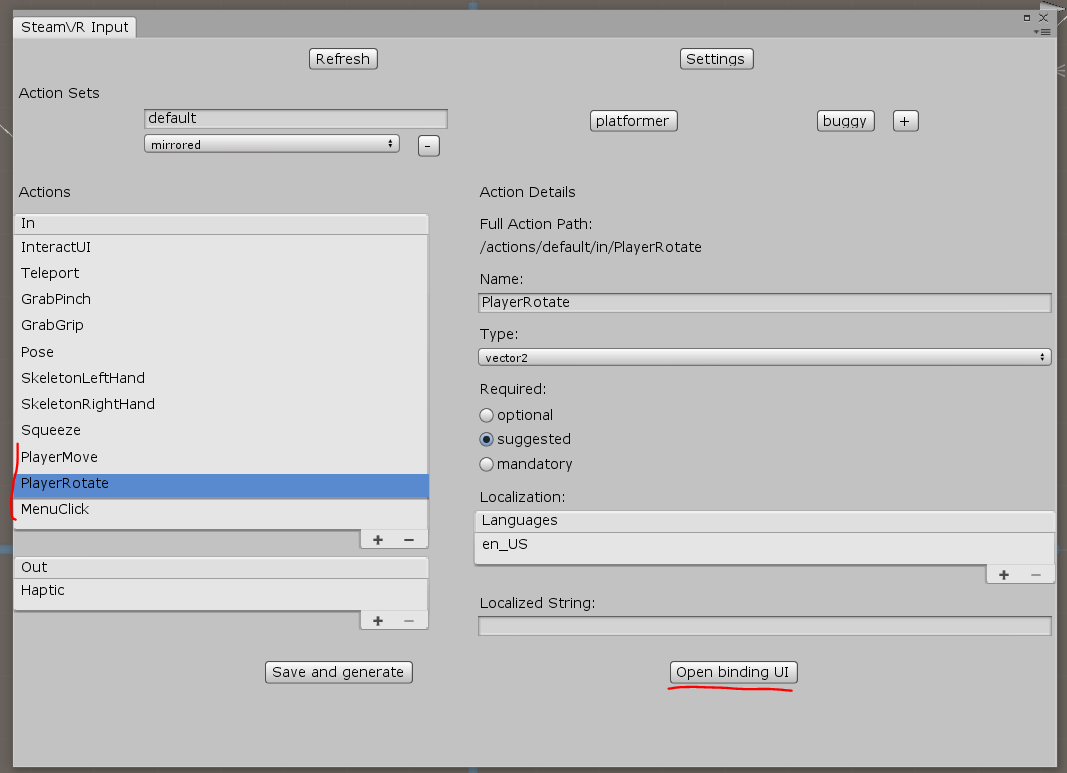
В браузере откроется вкладка Controller Binding — в ней нужно настроить связь наших действий с контролерами: PlayerMove мы повесим на левый TRACKPAD (не забудьте выключить Mirror Mode), PlayerRotate на правый TRACKPAD, а MenuClick повесим на клавиши Menu
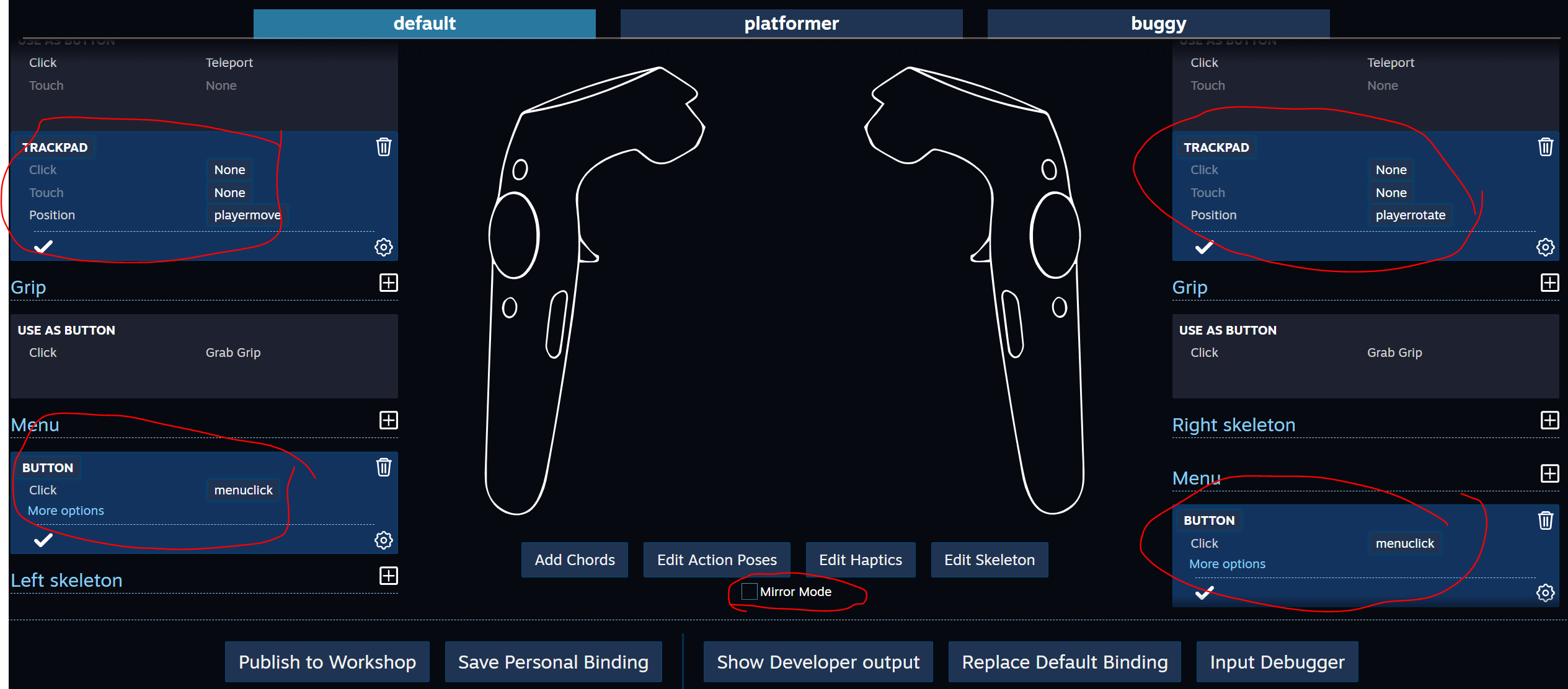
Закроем Controller Binding и сохраним изменения
В свойствах Player свяжем новые действия

Запускаем Play
Заключение
Следует отметить несколько моментов. Некоторые действия в SteamVR Imput могут заставить Unity задуматься надолго, в принципе эти изменения можно внести самому в код, а вместо использования Controller Binding можно напрямую править json-файлы, но большой риск ошибки которые сложно будет отловить.
Для более глубокого изучения плагина — полезно подробно изучить примеры, ну и конечно — читайте документацию.


viruseg
"Погуглил парочку примеров и начал пробывать".
Попробуйте использовать спелчекер, если уж совсем плохо с русским языком.
trir Автор
а что вас не устраивает?
viruseg
С «погуглить» как раз всё устраивает. А вот слова «пробЫвать» в русском языке не существует.
ПопробОвать или попробЫвать, как правильно писать?
trir Автор
такие веши прнято писать в личку